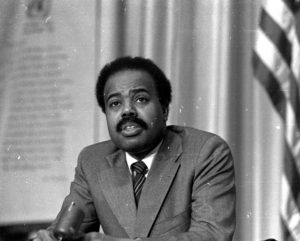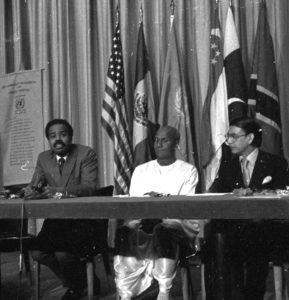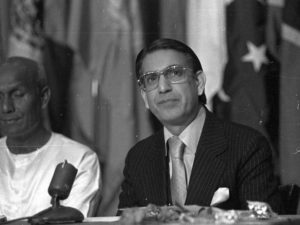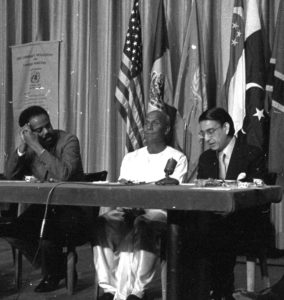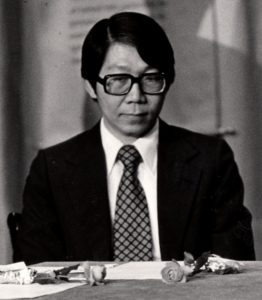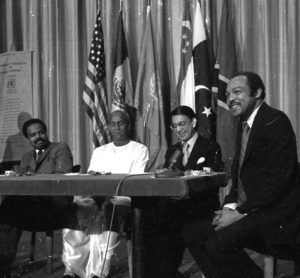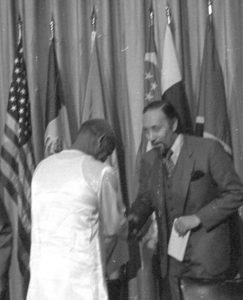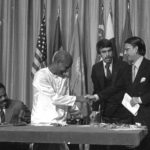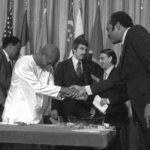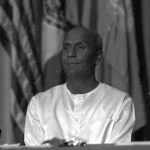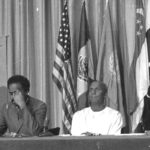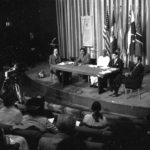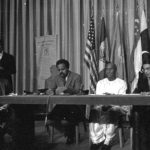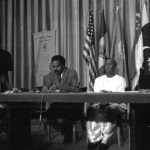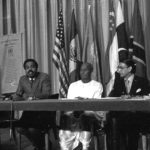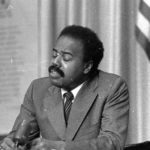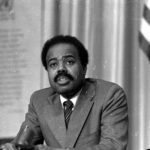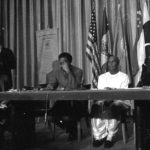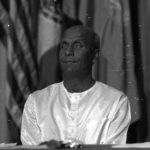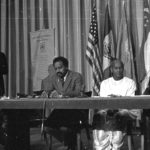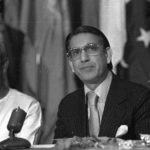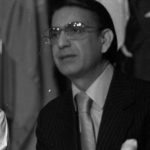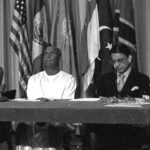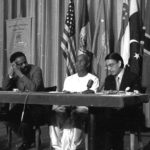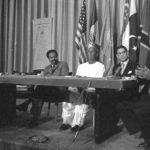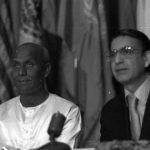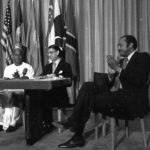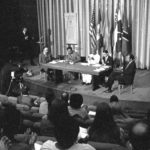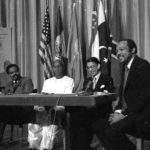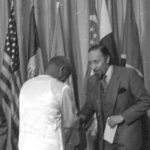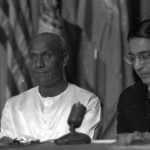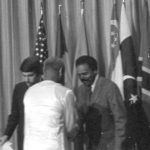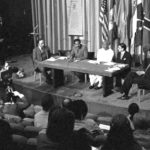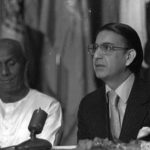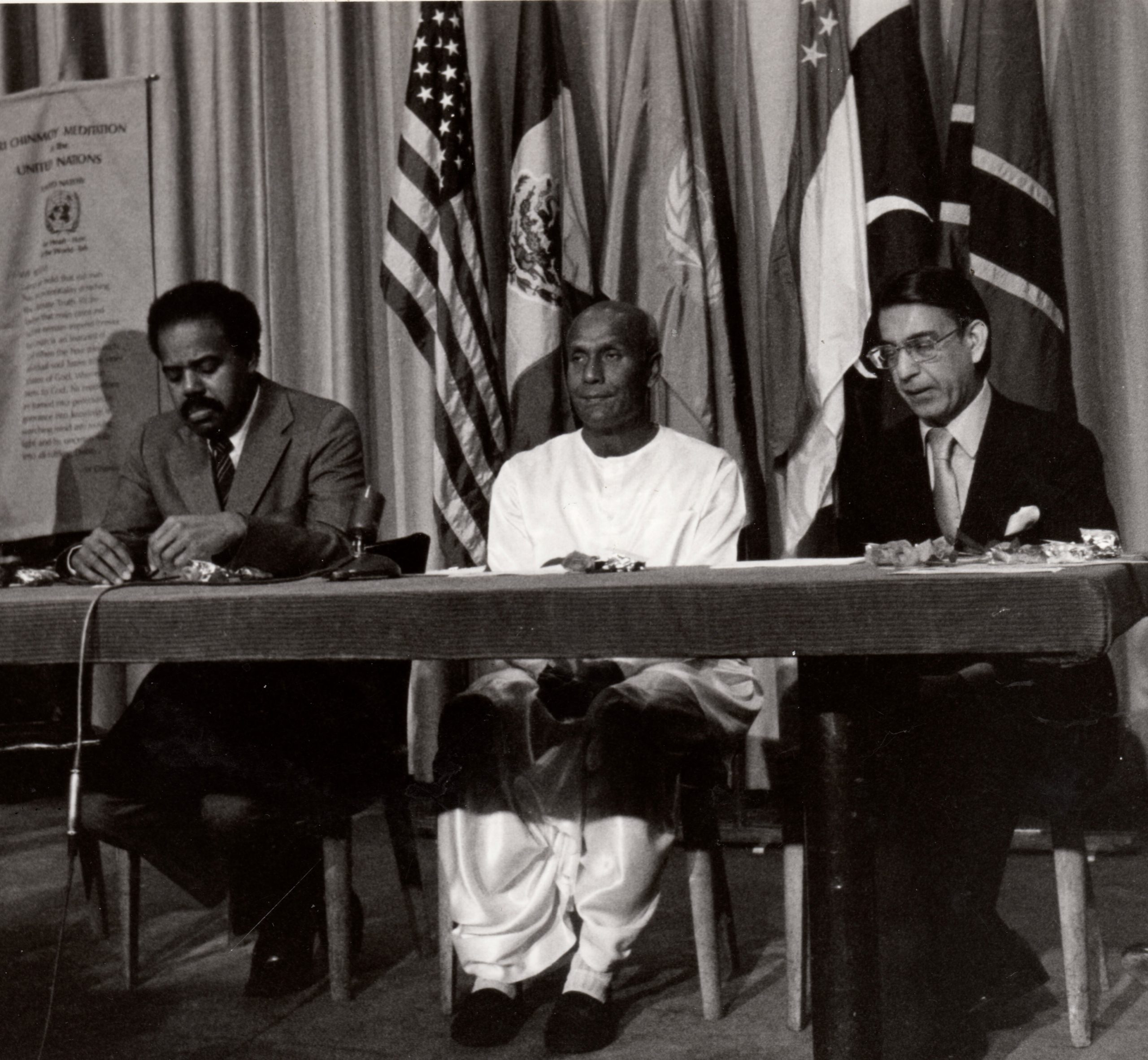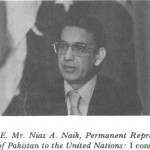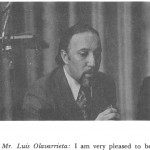M.L. King Jr. – Philosophy of Non-Violence 1980 Jan 15
Filed under americas | Tributes and Expressions of appreciationMARTIN LUTHER KING, JR. : THE PHILOSOPHY OF NON-VIOLENCE
On 15 January 1980 diplomats and journalists joined Sri Chinmoy and the Meditation Group in a tribute to Dr. Martin Luther King, Jr., and his philosophy of non-violence on the 51st anniversary of his birth.
. Speakers included Ambassador Donald McHenry of the United States; Ambassador Tommy Koh of Singapore; Ambassador Niaz Naik of Pakistan; WNBC-TV correspondent Mr. Carl B. Stokes, former Mayor of Cleveland, Ohio; and Mexican journalist Luis Olivarrieta. WPIX-TV’s U. N . correspondent Mr. Jeff Kamen was Master of Ceremonies
A similar observance was sponsored by the Meditation Group in 1977 at which Mrs. Coretta Scott King, then a U. S. Representative to the General Assembly, was guest of honour.
Excerpts from the programme follow.
 Opening meditation led by Sri Chinmoy.
Opening meditation led by Sri Chinmoy.
Mr. Jeff Kamen: Good afternoon and welcome. Today would have been the 51st anniversary of the birth of Martin Luther King. Jr. We all would have had the joy of celebrating it with him had it not been for an assassin’s bullet. But that does not mean we cannot celebrate his glowing spirit, his magnificent message and his inner call to all of us to deal with the problems that we face in our individual lives and in the world through what Martin Luther King, Jr. called “creative non-violence.”
This assumes from the very outset that there is something very fine and decent in each one of us at our birth and that it stays with us, that it can be called upon if only each of us would try.
The name of our programme today is,
“Martin Luther King,Jr.: The Philosophy of Non-Violence; A United Nations Observance of the Martyr, his Thought and its Relevance in Our Day.“
As you all know, events here at the United Nations in the past seventy days have been incredibly mixed and tense, sometimes confused. That is also the nature of the world and one of the reasons why it is so important that people who care about humanity and its survival and its hope of flourishing celebrate the beauty and spirit and truth of Martin Luther King, Jr.
We’re going to begin now with a moment of silence in honour of the spirit of Martin Luther King, Jr. which undeniably is with us all now and with all people who care.
Please join in a meditation in silence for Martin Luther King, Jr., led by Sri Chinmoy.
(A brief meditation follows.)
Our first speaker is America’s pride, Donald McHenry, Ambassador of the United States to the United Nations.
H .E. Mr. Donald F. McHenry: Permanent Representative of the United States to the United Nations:
It is particularly fitting, I believe, that we should gather here on these grounds to commemorate the birth of Martin Luther King, and more importantly, to commemorate the message by which he lived and which he left to mankind. Martin Luther King was an American who believed very strongly, very deeply in the principles of the United States and its Constitution.
He recognized that while they are principles that have been laid down, they areas is the case of many things-ideals towards which one has to work. They had not been achieved in his lifetime. I do not believe, from what I know of him, from what I have read and from what I have heard, that he ever despaired of attaining the goals of the American dream. Rather, he looked upon the American Constitution in the same way that I think 28 the community of nations ought to look upon the United Nations Charter. It is not something that one necessarily achieves immediately, but it is a series of goals towards which one can work.
King combined, in my judgement, the best in the American spir
it with some of the teachings of others. This was true whether one was talking about the writings of Thoreau or the non-violence of Mahatma Gandhi. King clearly believed that the law was there to be obeyed and that those who felt they could not do so, must be willing to pay the penalty of failure to observe the law. And therefore we see those very poignant pictures of King being fingerprinted or led off to jail, and we are able to read the famous letter from the Birmingham jail. I think all of these are indications of how far he was willing to go and the price he was willing to pay in order to stand up for the principles by which he lived.
In this, the fifty-first year of the birth of King, I would hope that that kind of thinking, that kind of ever striving to attain a goalwith the realisation that it will not come easily and that sometimes one has to pay a price in order to attain a goal or principle-can somehow serve also to help us solve some of the very real problems which remain in the United States and in other countries and in relations between countries.
I should like to close with only one additional statement, and it is one King made towards the end of his life, after the laws had been changed in Alabama and Georgia and in many places in the country, when one could now sit on the stool in a restaurant, or theoretically, buy a house and get a job. He recognized that the task was, in a sense, only beginning. He said, “It was a poor joke to ask 29 a bootless man to pull himself up by his bootstraps!” I think that remark is a lesson for us in international affairs. We have made, in the last thirty years, magnificent progress in political independence, but we still have to move on towards the realisation of the principle of self-determination and do that which we can to help people attain the boots so that they can pull themselves up by their bootstraps. Thank you.
Mr. Jeff Kamen:
We have just seen and heard one subtle example of how it is that Donald Mc Henry has made such a powerful mark on the international community in such a short time.
Martin Luther King, Jr. was fond of the following lines: “Just a tiny minute, just sixty seconds in it. It wasn’t mine to choose it, but I know I can’t refuse it, because Eternity is in it.”
And at this moment, this instant of time of our lives-when I say “our lives,” I mean the lives of the people of this planet-no country is more acutely aware of the acuteness of the moment than Pakistan. The headlines tell us why. It is a nation on the spot. And its extraordinary diplomat on the spot here at the United Nations is a man whose word and bearing commands something that goes beyond respect. I need only now introduce him, Ambassador Niaz A. Naik.
H.E. Mr. Niaz A. Naik, Permanent Representative of Pakistan to the United Nations:
I consider it a great honour and privilege to be included in this 31 programme today to pay homage to the memory of Dr. Martin Luther King, a man whose life was dedicated to the eternal ideals of love, peace and equality. His message of universal brotherhood and equality of man speaks for the collective conscience of mankind. It is always great men who, in their profound vision and powerful eloquence, have enunciated this message in the troubled phases of human history to save the world from destructive conflicts. Indeed, this message is, in a sense, a great movement to restore human dignity and fight oppression and injustice in human society.
During his famous march to Washington in 1962, Dr. Martin Luther King outlined his beliefs, and I would like to quote his thoughts. He said, “I have a dream that one day little black boys and black girls will be able to join hands with little white boys and girls as sisters and brothers.” This simple but powerful expression of his philosophy, of his vision, was a clear call for universal brotherhood, love and peace.
All great religions enjoin upon mankind the ideals of peace, love and brotherhood. In a clarion call for struggle against tyranny, exploitation of man by man and people by people, Islam has proclaimed that the white man is not superior to the black, but all are equal in the sight of the Creator. I belong to that religion, and this is the divine message of the Holy Koran, which says, “Remember the Favour of Allah, which He bestowed upon you when you were enemies, and He united your hearts in love so that by His Grace you became as brothers.”
The great endeavours of Dr. Martin Luther King were an unprecedented struggle aga
inst the injustice and inequalities that he witnessed in the ontemporary world. The voice of Dr. Martin Luther King did not represent an individual. It echoed the hopes and aspiration of mankind.
His message has a special meaning as we enter the decade of the 1980s, in a world dominated by strife and tension. It has a special appeal for the small and medium-sized countries of the Third World who are struggling for peaceful co-existence and for the right of their people to live in honour, dignity and prosperity. These nations dream of a world free of conflicts, where justice prevails. It would be a fitting tribute to the late leader for us to work jointly and collectively for a new world order to ensure justice, equality and peace for all men.
Mr. Jeff Kamen:
One of the things Martin Luther King taught first America and then the world was not to underestimate who people may really be just because we see them in one role or another. Dr. King kept telling black Americans that the first thing they had to do was to put their shoulders back and stand with their back straight. Dr. King would say the reason to do that is because a man can’t ride your back when it’s straight. The message really transcended one of a black leader and black people. It was a message to the world, to all of us, and the people of the Third World were listening not only to Martin Luther King, Jr., but to others who heard his words and adapted them. Now we will hear from a small nation whose ambassador has probably some of the finest prestige anywhere in the international community. That is not only a tribute to him but also to the emerging reality of equality among nations, to which Ambassador McHenry referred earlier. And so it is especially important that we have with us today his Excellency Tommy Koh, the extraordinary Ambassador from Singapore.
H. E. Mr. T. T. B. Koh, Permanent Representative of Singapore to the United Nations:
Thank you very much. I want to make a very brief personal testimony on the influence that the late Martin Luther King has had on my life. I want to recall that in the years 1963 and 1964 I was a graduate student in this country. I think that was a truly historic period in the life of this nation. It was a moment pregnant with the prospect of a historic change in race relations.
Martin Luther King seized that historic moment and was able to impress upon the American national conscience the many shortcomings of the country in respect of the treatment of its coloured people and to bring about a truly deep and historic change in the attitudes of the American people toward its coloured peoples.
I was deeply affected by Martin Luther King’s teachings, by his courage and his charismatic leadership. I come from a country which is also multi-racial and I believe deeply in the ethic which Martin Luther King taught, which is that one must always judge a man or woman by the content of his or her character rather than the colour of his or her skin.
I was so moved by him that in the summer of 1964, when I had completed my graduate work at Harvard, I volunteered to spend the summer working in Roxbury, in Boston. That was a great experience which I shall always remember. I have tried to put into practise many of the moral and ethical values which Martin Luther King taught the world.
I also deeply admire him because of his commitment to change through non-violent means. I think it takes a man of extraordinary moral content like King and like Gandhi to believe in that ethic and to be able to bring about the almost revolutionary changes in this country and in India that these two great men did.
Mr. Jeff Kamen:
We are still a divided nation here in the United States. Racism is a reality. People of good will are struggling, but struggle means work and not everybody likes to work, especially not all the time. But one part, at least, of Martin Luther King, Jr.’s dream was realised in 1967, the year before his death. That was the election of a big city mayor who happened also to be black, and he is with us today. He is Carl B. Stokes, now a political correspondent for Channel 4 in New York, WNBCTV the first American black elected mayor of a major American city, that of Cleveland, Ohio.
Mr. Carl B. Stokes, WNBC-TV:
Ladies and gentlemen, Martin Luther King did achieve a great portion of what he wanted to do in this country. Because of his efforts, he literally changed the legal face of this nation. It’s difficult for many of you who come to the United States from other countries to hear us talk about justice and democracy and human rights, when you look around and see on every hand the imperfection that exists here. You say: “How can you say things like that?” and “Why don’t you change what is so wrong in this country?”
You have to be my age to know that change has occurred. When Martin began the Civil Rights Movement in the late 1950s, you have no idea how segregated, legally and informally, this country was. At that time black boys and girls couldn’t hope to be a United States delegate to the United Nations. They could have no expectation of being a commentator or an anchor man or anchor lady on a television station not even a radio station. None of them could think about sitting on corporate boards. None of them could think about being heads of educational institutions, because twenty years ago they couldn’t even attend those institutions as students! They couldn’t get a job there as a teacher. So it would have been ludicrous to think about one of them being the literal head of these institutions.
All of that has changed. Martin not only forever removed the legal structure that imposed and kept constant legal separation of the races, but he then was the spearhead, along with A. Phillip Randolf, the great labour leader, in leading the march on Washington. The march was literally against a President who was good in many ways, but who had not felt that Congress or the nation was ready to take on the heavy legislative responsibility of an all-encompassing bundle of civil rights laws that would say, “We’re wiping out legal discrimination and legal injustice in this country.” A. Phillip Randolf and Martin Luther King, Jr. put together the 1963 march on Washington that brought together a quarter of a million American citizens, white and black, men and women, young and old, persons from every religious denomination, from literally ever y walk of life. Never before had this country risen up and manifested in as many components its willingness to face what had been one of the most serious problems in this nation since its inception, namely the relationship between white and black. That convinced the President. He introduced the civil rights bill passed in 1964 that outlawed for all time discrimination agin st men and women on the basis of their colour, their race, their national origin. And that subsequently served as a vehicle to eliminate another remaining problem in our country, that of discrimination against women.
hen, in 1965, Martin was part of leading the move to enact the 1965 Voters’ Rights Act, which totally transformed the South, a total political facelift. Today the states of Mississippi, Alabama and Georgia have more elected black officials than do the states of New York, New Jersey or Pennsylvania. In counties where blacks could literally not hold jobs or could not go to a restaurant, today the sheriff is black, the county recorder is black, the county commissioner is black. In Atlanta, the citadel of the South, the mayor is black. And just a couple of months ago, in of all places Birmingham, Alabama, a black man was elected mayor.
These are the things that I think about in regard to Martin because often we don’t give him credit for the permanence of the change that he brought about. It seems to be one of the weaknesses of people: always to think ab out the way things are today as opposed to the way that they were. The best way to sum up, at least for me, is to repeat a saying from an old Negro slave woman that Martin always used to use at the end of his remarks. He would try to help people remember the way it used to be and give them a message for the future. He would say: “We ain’t what we want to be and we ain’t what we’re gonna be, but thank God, we sure ain’t what we was.”
Mr. Jeff Kamen:
Our final speaker is the Mexican journalist Luis Olavarrieta, a person who has dedicated his life to peace and is using journalism to further that cause.
Mr. Luis Olavarr£eta:
I am very pleased to be with you and very honoured to be in such distinguished company. As a neighbour of this country and as someone who has been coming here for many years, I see the change that has taken place in the United States.
Certainly Martin Luther King had a very definite impact on this nation and on many other nations as well. I would like to pay homage to his memory by speaking about something, in addition to non-violence, in which he was also very interested, peace.
All of us have seen films devoted to war and the justification of violence in the name of one or another ideology or in support of a political or religious obsession. We have observed the sophistication of the means of destruction. This sophistication culminates and is controlled from a large chamber which is called the war room. In this chamber and with the help of the latest technology, all the events of the armed conflict are registered upon huge maps on the walls: the armoured divisions that advance or retreat, the battles in process, the movements of friendly and enemy fleets, the deployment of bombers or the massive destruction of cities and civilians. Upon large tables and on relief maps the combat action is updated free of blood and fire. Trained hands move models of tanks, artillery pieces, small flags that represent a thousand or ten thousand soldiers. In this terrifying chess game the pieces are constantly changed to reflect victory or defeat.
There is nothing similar for peace. In the whole of our entire convulsed planet there is no peace room-no chamber from where to coordinate the constant efforts of the peace forces; the daily struggle of those who fight against ignorance, oppression and disease; the struggle of the people who continuously fight against injustice and discrimination, against political short-sigh tedness and ideological blindness. There is no peace room to coordinate the fight against war itself and its origins. To honour all the heroes of peace, such as Martin Luther King, it seems feasible at this stage of human evolution and within the framework of the United Nations, to undertake the construction of a peace room. That would be, I think, a fitting tribute to all people who have striven for peace throughout the entire planet.
Thank you very much.
DIPLOMATIC WORLD BULLETIN January 28, 1980
Diplomats Honor Dr. King
 Silent meditation on the spirit of Dr. Martin Luther King, Jr. at King Day observance in Dag Hammarskjold Auditorium, January 15. Left to right: Mexican Journalist Luis Olivarrieta, Ambassador Tommy Koh of Singapore, Ambassador Donald McHenry of the U.S., Sri Chinmoy who organized event, Ambassador Niaz Naik of Pakistan and carl B. Stokes, WN BC T.V., former Mayor of Cleveland, Ohio
Silent meditation on the spirit of Dr. Martin Luther King, Jr. at King Day observance in Dag Hammarskjold Auditorium, January 15. Left to right: Mexican Journalist Luis Olivarrieta, Ambassador Tommy Koh of Singapore, Ambassador Donald McHenry of the U.S., Sri Chinmoy who organized event, Ambassador Niaz Naik of Pakistan and carl B. Stokes, WN BC T.V., former Mayor of Cleveland, Ohio
…Celebrate the spirit of non ·violence on the 51st anniversary of the birth of Dr. Martin Luther King, Jr; .
Ambassador Donald McHenry of the U.S. opened the King Day observance declaring, • it is particularly fitting that we should gather on these grounds to commemorate the birth of Dr. King and more importantly the philosophy by which he lived and the message he l eft to mankind. “He looked upon the American Constitution in the same way we at the United Nations ought to look upon the U.N. Charter: not necessarily something one achieves immediately but rather a series of goals towards which one can work. “Dr. King never despaired of achieving the American dream outlined in the Constitution and I think we should not despair of achieving the world dream outlined in the Charter.”
Ambassador Tommy Koh of Singapore, a young, highly regarded leader of the nonaligned movement, revealed that he had been, “deeply affected by Martin Luther King’s teaching, his courage and his charismatic leadership,” and had been so inspired by Dr. King that when he finished his graduate studies at Harvard in 1964, Mr. Koh spent the summer working to help the poor of the Roxbury. Mass. ghetto.
Niaz. Naik, Pakistan’s Ambassador, an Islamic scholar, veteran diplomat and Islamic scholar, said of the martyred Nobel peace prize winner: “ his message of the universal brotherhood and equality of man speaks for the collective conscience” of humanity.”
PDF format of report in periodic Bulletin : “Meditation at the United Nations” Feb 1980
bu-scpmaun-1980-02-27-vol-08-n-02-feb-ocr-opt.pdf
See Page-images 33 to 49
Gallery 2 below is jpg format
Gallery 1 Photos from event
- Shraddha
- Shraddha
- Shraddha
- Shraddha
- 1979-12-10-0-Donald-McHenry-usa-Sri-Chinmoy-1980-jan-15?king-prog
- 1979-12-10-10-Luis-Olivarrieta-Donald-McHenry-usa-Sri-Chinmoy-Niaz-Naik-Pakistan-Carl-Srokes 1980-jan-15?king-prog
- Shraddha
- Shraddha
- Shraddha
- Shraddha
- Shraddha
- Shraddha
- Shraddha
- Shraddha
- Shraddha
- Shraddha
- Shraddha
- Shraddha
- Shraddha
- Shraddha
- Shraddha
- Shraddha
- Shraddha
- 1979-12-10-05-Luis-Olivarrieta-Don-McHenry-use-Sri-Chinmoy-Niaz-Naik-Pakistan-Carl-Stoke-1980-jan-15-king-prog?
- Shraddha
- Shraddha
- Shraddha
- Shraddha
- Shraddha
- 1979-12-10-06-L.Olivarrieta-D.-McHenry-use-Sri-Chinmoy-N.Naik-Pakistan-C-Stokes-1980-jan-15-king-prog?
- Shraddha
Gallery 1 A: – Photos versions scanned from original paper copies:
- 1980-01jan-15-ML-King-Non-Violence-Carl-B-Stokes-WNBC-TV-speak-scaled.jpg- 565 KB
- 1980-01jan-15-ML-King-Non-Violence-Amba-Tommy-Koh-Singapore-scaled.jpg
- 1980-01jan-15-ML-King-Non-Violence-Amba-Tommy-Koh-Singapore-2-scaled.jpg
- 1980-01jan-15-ML-King-Non-Violence-amb-McHenry-usa-02-scaled.jpg
- 1980-01jan-15-ML-King-Non-Violence-amb-McHenry-02-scaled.jpg June 9, 2020
- 1980-01jan-15-ML-King-Non-Violence-amb-McHenry-scaled.jpg
- 1980-01jan-15-ML-King-Non-Violence-Mexican-journalist-Luis-Olivarrieta-scaled.jpg
- 1980-01jan-15-ML-King-Non-Violence-Mexican-journalist-Luis-Olivarrieta-2-scaled.jpg
- 1980-01jan-15-ML-King-Non-Violence-amb-McHenry-usa-Sri-Chinmoy-Amb-Naik-Pakistan-scaled.jpg
- 1980-01jan-15-ML-King-Non-Violence-Carl-B-Stokes-WNBC-TV-scaled.jpg
- 1980-01jan-15-ML-King-Non-Violence-Carl-B-Stokes-WNBC-TV-03-scaled.jpg
- 1980-01jan-15-ML-King-Non-Violence-Carl-B-Stokes-WNBC-TV-02-scaled.jp
Gallery 2:
JPG scanned page images 33 to 49 “Meditation at the UN” Feb 1980
- bu-scpmaun-1980-02-27-vol-08-n-02-feb_Page_34-open-med-ckg
- bu-scpmaun-1980-02-27-vol-08-n-02-feb_Page_49-dip-world-1980-jan-28

